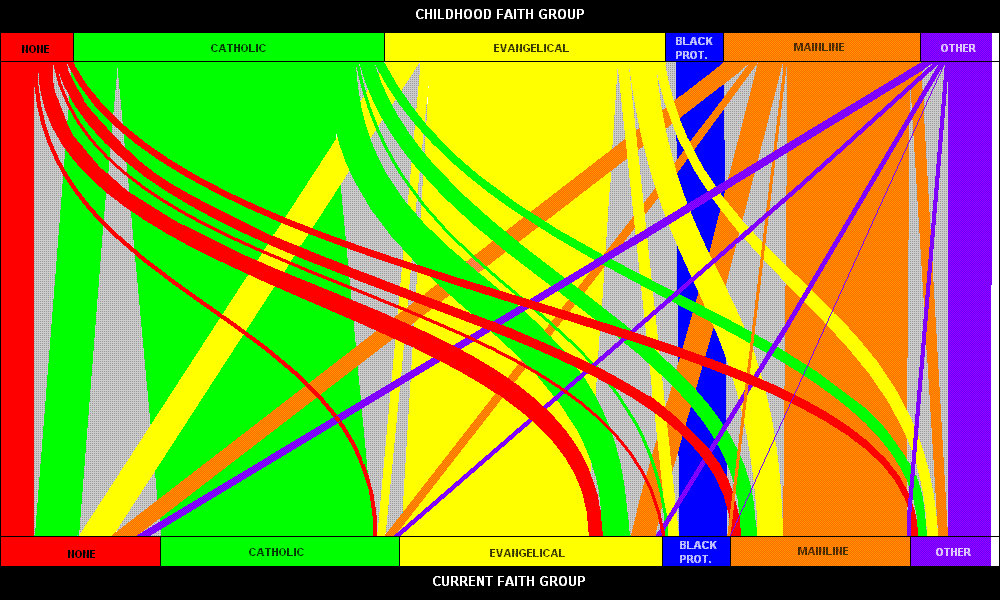The first response to the new survey at which I pointed my attention comes from a post on InternetMonk.com, by guest writer Michael Bell. Michael breaks down “inflows” and “outflows” of adherents by church affiliation -Catholics, Evangelicals, histo
 rically black Protestant, mainline Protestant, and The Others (he makes a nice Lost reference, too) - and he also provides a cool graphic that illustrates his descriptions of flow of worshippers between institutions (see right). Linked below, my response delves deeper into the analysis that Bell provides on the topics of where the overall religious population is headed, and what worries Christian institutions may have now and in the future.
rically black Protestant, mainline Protestant, and The Others (he makes a nice Lost reference, too) - and he also provides a cool graphic that illustrates his descriptions of flow of worshippers between institutions (see right). Linked below, my response delves deeper into the analysis that Bell provides on the topics of where the overall religious population is headed, and what worries Christian institutions may have now and in the future.Secondly, I examined the viewpoint from the opposite side of InternetMonk’s Christian perspective at FriendlyAtheist.com, written by Hemant Mehta (I love when one of someone’s names contains all the letters of his other name). Hemant asks, “Why are the religious unaffiliated becoming religious later in life?” My response piggybacks off Hemant’s analysis of what religion has to offer that the secular life does not, at least at this time in American history.
"Michael Bell: Looking at the Pew Forum's 'Changes in Religious Affiliation' Data"
Comment
Hey Michael,
You provide a good, thorough breakdown of the new Pew survey results, and I am interested to hear the analysis of these data from an informed Christian perspective. Your next post will have a lot of fun hypotheses, I’m sure: the full report of the survey shows how deep the Pew Forum folks went in trying to determine exactly why a person would “switch faiths,” which, when analyzed critically, should provide a better picture on the relationship between one’s faith and all the other things that are going on in one’s life, which I think is what you may be trying to get at in this project of poring over the survey results.
I thought your co-worker’s question was interesting, about whether based on this data can we ask when religion will be extinguished in America (extinguished is kind of a harsh word, but I guess it fits the perspective). I agree with your take, that this question makes many assumptions: of course rates of inflow and outflow will not remain constant, and I have to think that there are widespread cultural signifiers that act on these flow rates in ways that might not be clear, even given this survey. It would be interesting to see what these rates were like 25, 50, 100 years ago; surely then somewhat significant predictions could be made as to what the religious landscape in America will look like in the future.
As someone who was raised Presbyterian, fell out of it in my teens, and now am unaffiliated (under which category would “Jedi” fall?), seeing data informed by paths similar to mine not only piques my interest, but makes me enthusiastic about gaining insight towards why we believe the things we do, and how much control we do or do not have over our beliefs. All that fun stuff. Keep up the good writing and analysis.
"Why Are the Unaffiliated Becoming Religious Later in Life?"
Comment
Hemant, first time reader here who digs your take on the Pew survey results. I have read analysis on other sites from a Christian perspective, which focused on the outflows of people from religious affiliations into having no religious affiliations, so it is cool to read a breakdown from the atheist perspective where you are flipping that around.
Your conclusion that atheists are “hurting ourselves if we shun all the positive things churches provide just because we find their beliefs so irrational” is right on, in my opinion. As someone about to finish college, I’ve often thought about the opportunities for working for religious institutions and how those opportunities are not exactly available in the secular world. Sure, there are spiritual counselors and charity or social workers, but the job of a pastor, for example, is so clear cut and well-defined: teach from scripture, relate your spiritual counseling to the outside world, help the needy, and so on. In thinking about this, I’ve wished for a “church” that offers a position like that, only without the scripture behind it. Does Unitarianism provide the answer?

The concluding sentence of your post is key: I’m not sure if they Pew results back this up, but surely there is a large group of people who become regular attendees of a religious institution because they feel they need to raise their kids in “that kind of environment,” one that provides the teaching of morals from some power that is not the childrens’ parents as well as a sense of community. So I agree: there exist options other than buying into attending church, which should be the most serious of commitments, to raising your kids. Don’t say you’re religious when you’re only at church for familial, perhaps non-spiritual reasons.
